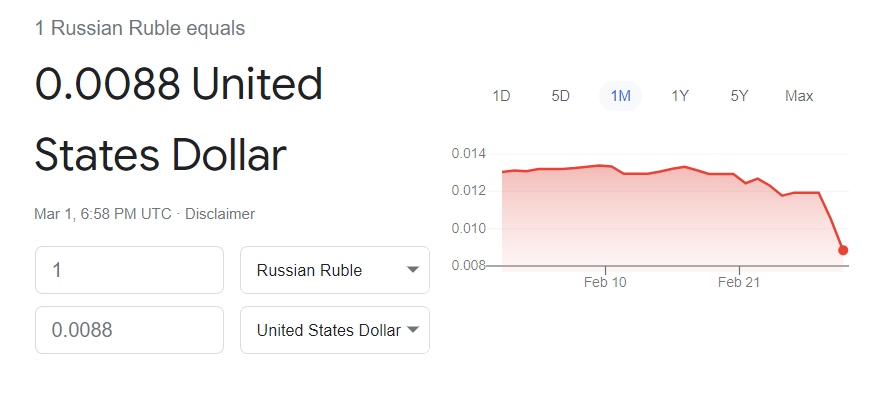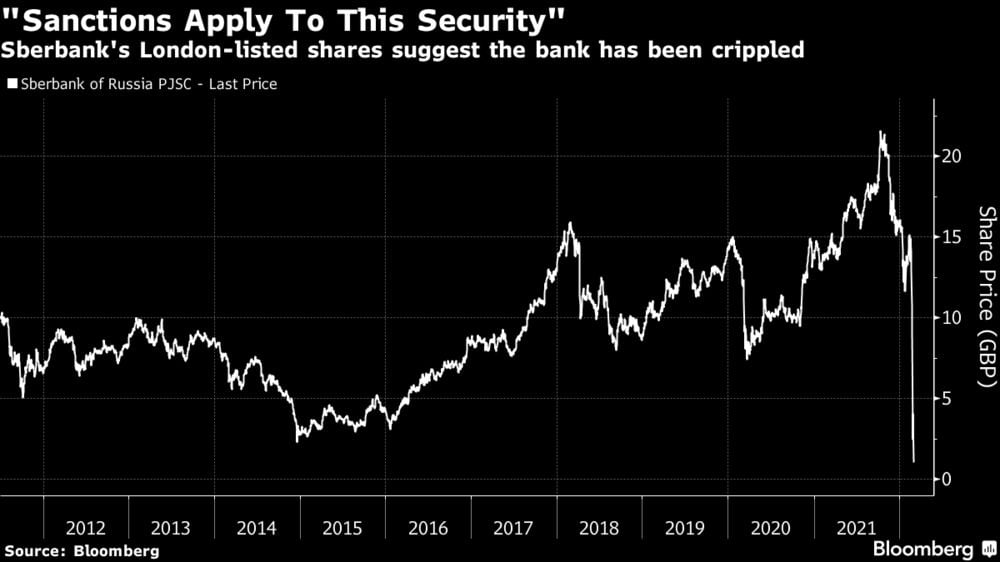First, if you missed The war in Ukraine isn’t working out the way Russia intended in the Washington Post, from yesterday’s blog post, be sure to take a look. And then follow that up with Fred Kaplan at Slate.
Michael Kofman, a military analyst at CNA, an Arlington, Virginia–based think tank, who has been following the battle closely, tweeted late Sunday afternoon, “It’s taken me a while to figure out what [the Russian military is] trying to do, because it looks so ridiculous and incompetent.” B.A. Friedman, a military historian and tactician, went further: “This isn’t a good army executing a bad plan. It isn’t a good army executing outdated or out-of-context tactics. It’s a bad army!”
Then Kapan goes on for a few paragraphs about all the military mistakes the Russians made going into Ukraine. The word “amateurish” comes to mind. Do take a look.
There is a larger factor here: The Russian army is composed, by and large, of one-year conscripts, who are poorly trained (even within the confines of Russian military training), badly treated, and uninspired by ideology or any other motivating spirit. Hence the stories of captured Russian troops who had no idea why they were in Ukraine. At least a few didn’t even know that they were in Ukraine—they thought they were still doing exercises in Belarus. Others have reportedly been found knocking on village doors for food or, in one case, asking a local police station for fuel.
The Russian army is not trained to improvise if the plan worked out at headquarters falls apart. “In politics and in warfare, the small elite on top doesn’t want subordinates to get too creative—if they did, they might take over,” Kaplan writes. If Step 2 doesn’t work, the Russians will still go on to Step 3, because that’s all they know. “Therefore, large troop-transport planes tried to land, even though the airport hadn’t been completely secured and Ukrainian air defense systems hadn’t been destroyed. As a result, two Il-76 transport planes, each carrying 100 airborne troops, were shot down.”
You’ve probably heard about the massive Russian convoy slowly lumbering toward Kyiv. We’ve all seen the satellite images. The tanks and other military vehicles are not being escorted by infantry, and I understand there are no combat planes above, protecting them. If it weren’t such a one-sided war, I imagine those tanks would have been bombed to oblivion already. Were it not for nukes, I’m sure somebody else’s bombers would have taken care of it. Unfortunately, the convoy is still moving as I write this.
Speaking of planes, see The Mysterious Case of the Missing Russian Air Force. I don’t know anything about this site or the author, but it does describe a puzzling lack of coordination on the Russians’ part.
This is not to say that the Russians are going to lose, because they still have overwhelming advantages over the Ukrainians. And the Russian troops are about to be reinforced by troops from Belarus and Chechnya, I understand. But it does suggest that the Russian military isn’t as formidible as it was cracked up to be. Putin’s move into Ukraine revealed a huge weakness.
Looking at Russia from another angle — Paul Krugman is calling Russia a “Potemkin Superpower.”
Before Putin invaded Ukraine, I might have described the Russian Federation as a medium-size power punching above its weight in part by exploiting Western divisions and corruption, in part by maintaining a powerful military. Since then, however, two things have become clear. First, Putin has delusions of grandeur. Second, Russia is even weaker than most people, myself included, seem to have realized.
First, Krugman says, Russia’s economy is so small — a little more than half the size of either Britain’s or France’s — it seems remarkable that it could support a world-class military. And, in fact — maybe it couldn’t.
Further, Russia’s standard of living “is sustained by large imports of manufactured goods, mostly paid for via exports of oil and natural gas,” Krugman writes. This left it vulnerable to sanctions that might disrupt trade.
Before the invasion it was common to talk about how Putin had created “fortress Russia,” an economy immune to economic sanctions, by accumulating a huge war chest of foreign currency reserves. Now, however, such talk seems naïve. What, after all, are foreign reserves? They aren’t bags of cash. For the most part they consist of deposits in overseas banks and holdings of other governments’ debt — that is, assets that can be frozen if most of the world is united in revulsion against a rogue government’s military aggression.
I googled for the current value of the ruble, and got this —

I got this from an economist friend today — this is the chart of a Russian bank listed on the London stock exchange.

This is a new thing. We’ve never seen so much of the world rise up to impose such crippling sanctions on a rogue nation before. This could change the entire calculus of warfare. Perhaps the U.S. doesn’t need to be spending so much on being prepared to fight World War II again. Or, as long as we don’t plan to invade anybody, I suppose.
Back to Krugman —
But Europe mainly burns gas for heat; gas consumption is 2.5 times higher in the winter than it is in the summer. Well, winter will soon be over — and the European Union has time to prepare for another winter without Russian gas if it’s willing to make some hard choices.
Of course, gas is going up here, too. The Right is going overboard blaming Biden for our dependence on foreign oil, when they (and some centrist Democrats) are the ones who have blocked investment in alternative energies all these years. If we’d gotten started on weaning ourselves from fossil fuels back when people first started talking about it, the price of gas wouldn’t be an issue now, would it?
See also The Intercept, Saudi-Russian collusion is driving up gas prices. If the sanctions succeed in destroying Putin, send a note to Mohammed bin Salman — “You’re next.”
I keep reading that we’re on the brink of a new Cold War, but I don’t think so. I could be wrong, but what I’m seeing may just be the last gasp of the old Cold War and the beginning of a time in which the world’s democracies rely on other kinds of power to keep the despots in check. Let’s hope so.
Update: See In just 72 hours, Europe overhauled its entire post-Cold War relationship with Russia
